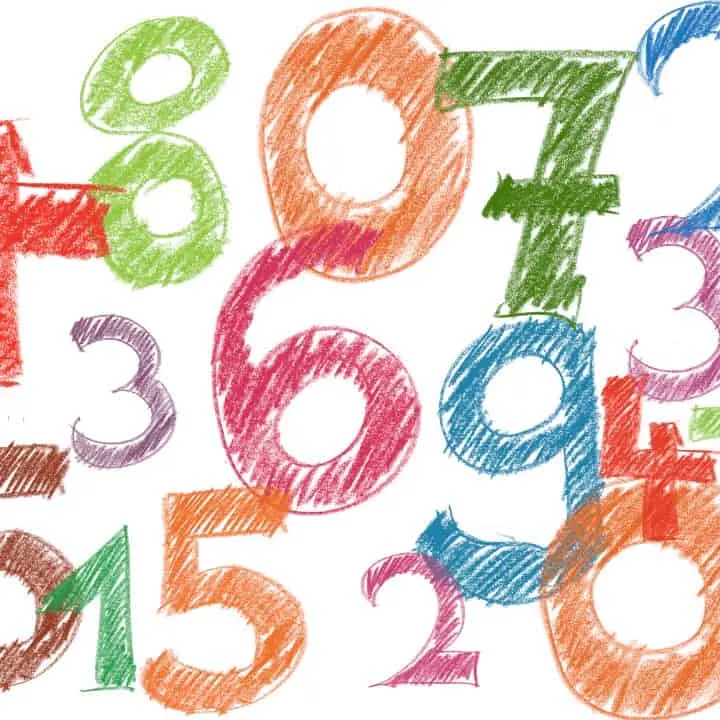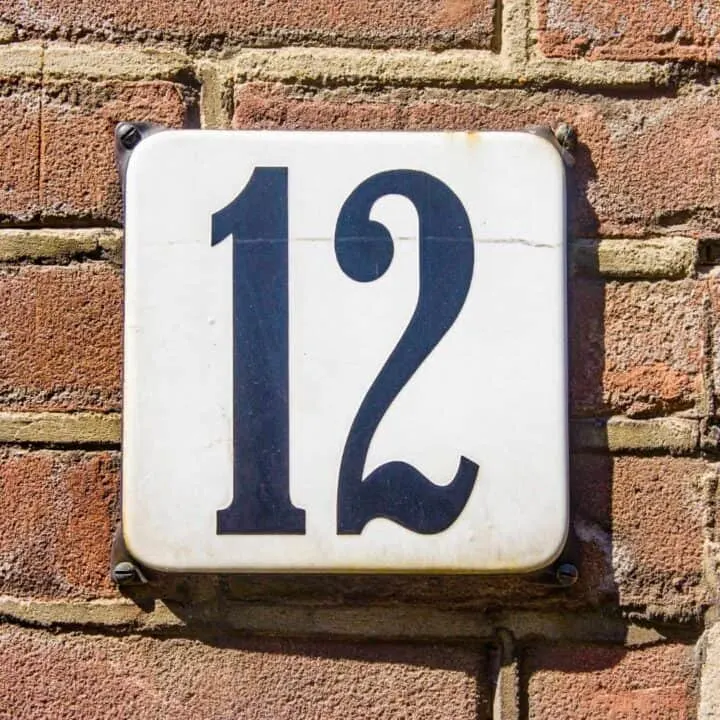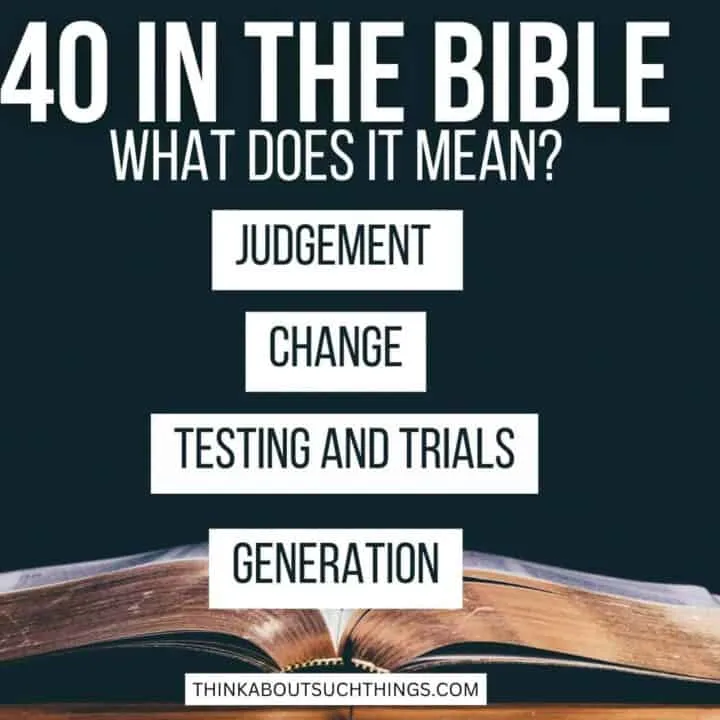In this article, we will keep exploring numbers, and this time around will be looking at the Biblical meaning of the number 4.
The number 4 isn’t usually considered one of the most significant numbers in the Bible, but it can reveal some vital context for many things. As we’ve seen in our study of Biblical numbers, the meaning should always be taken in the light of the portion you’re reading. It occurs 226 times in the Bible, in 192 different verses, with Ezekiel, Exodus, and Revelations mentioning it most often.
It is used in reference to people, rivers, beasts, visions, and plenty more. But what is the significance of the number 4 in the Bible, and what symbolism should you read into it when you encounter it in your Bible study?

The Biblical Meaning Of The Number 4: Let’s Look At The Hebrew
As we have gone through this series, you will notice we always bring up the Hebrew alphabet and how it is very closely linked to numbers, and there’s often much symbolism in the characters.
The number 4 is the equivalent of the Hebrew letter Daleth, and it originated from a Phoenician word that means “door.” However, the ancient Israelites associated an entirely different meaning with it.
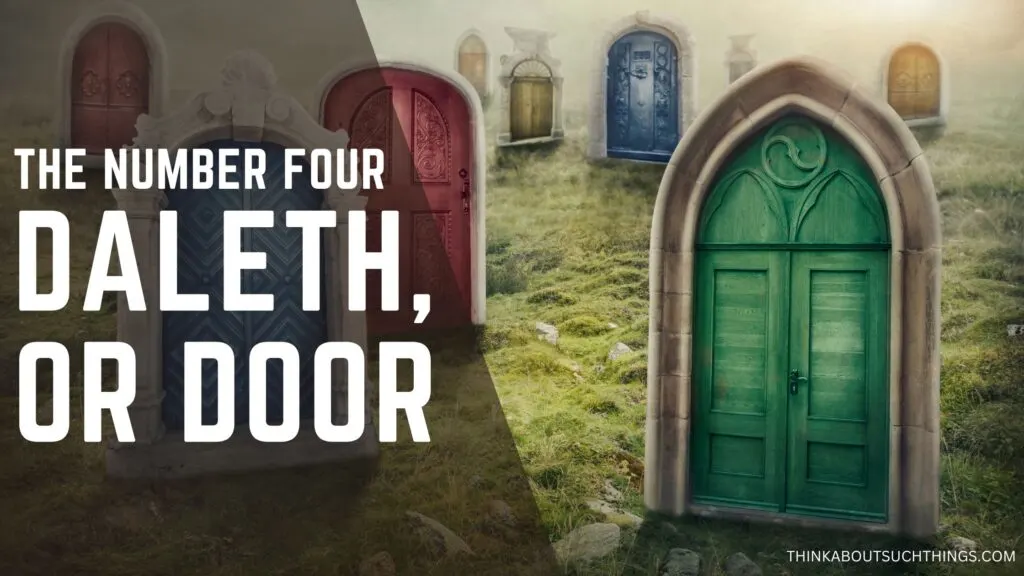
According to Jewish scholars, Daleth and the number four refer to the following:
- A metaphorical doorway between creation and the spiritual world
- The nature of the physical world and the creation (more on that in a moment)
- The four-letter name of God (YHWH)
- The four stages of interpreting the scriptures (literal, allusion, allegory, and secret interpretations)
All of this ties in very closely with the scriptural meaning of the number four.
The Number 4 In A Modern Biblical Context
Within the light of the scriptures, we can see that the number 4 is used to illustrate several things, but all of them are closely related to the creation and the seasons that the earth must go through.
The Creation Of The Universe
Then God said, “Let there be lights in the firmament of the heavens to divide the day from the night; and let them be for signs and seasons, and for days and years; 15 and let them be for lights in the firmament of the heavens to give light on the earth”; and it was so. 16 Then God made two great lights: the greater light to rule the day, and the lesser light to rule the night. He made the stars also. 17 God set them in the firmament of the heavens to give light on the earth, 18 and to rule over the day and over the night, and to divide the light from the darkness. And God saw that it was good. 19 So the evening and the morning were the fourth day. – Genesis 1:14-19
There’s a general rule in Bible interpretation called the law of the first mention. This rule states that the first time something is mentioned in the Bible will set a tone and context for interpreting every other time that same concept is mentioned. This isn’t always accurate or should be used, but it’s a good baseline for studying many aspects of the Bible.
According to the law of the first mention, the first time that the number four is mentioned in the Bible is in Genesis 1:14-19, within the context of the fourth day of creation, so there must be significance in what God created on that day: the sun, moon, and stars. We could summarize it as the creation of the universe.
So, the number four is tied very closely to the universe and physical creation. But remember, this is based on the law of the first mention.
The Seasons And Times
This same scripture in Genesis 1:14-19 states that God created these heavenly bodies to give light and to control time (literally the seasons, days, and years). When you think about this more carefully, you will notice some interesting points about this:
- There are four seasons: Spring, Summer, Autumn, & Winter. So, on the fourth day, God created four seasons.
- The Hebrew word for season is “moed,” which means “appointed times” or “divine appointments.”
מוֹעֵד môwʻêd, mo-ade’; or מֹעֵד môʻêd; or (feminine) מוֹעָדָה môwʻâdâh; (2 Chronicles 8:13), from H3259; properly, an appointment, i.e. a fixed time or season; specifically, a festival; conventionally a year; by implication, an assembly (as convened for a definite purpose); technically the congregation; by extension, the place of meeting; also a signal (as appointed beforehand):—appointed (sign, time), (place of, solemn) assembly, congregation, (set, solemn) feast, (appointed, due) season, solemn(-ity), synogogue, (set) time (appointed).
The Physical World (Creation)
If we look at the world’s creation, we can see that the number four resembles it even more strongly than the ancient Hebrews understood:
- God’s creation has four essential elements: earth, air, fire, and water.
- There are four basic chemical elements: hydrogen, carbon, oxygen, and nitrogen.
- The four wind directions or the four corners of the earth: North, East, South, and West.
In other words, it’s clear that the number four is closely associated with all creation and its place in time.
The Number Four In The Bible
To understand it a bit better, let’s look at some scriptures that mention or reference the number four.
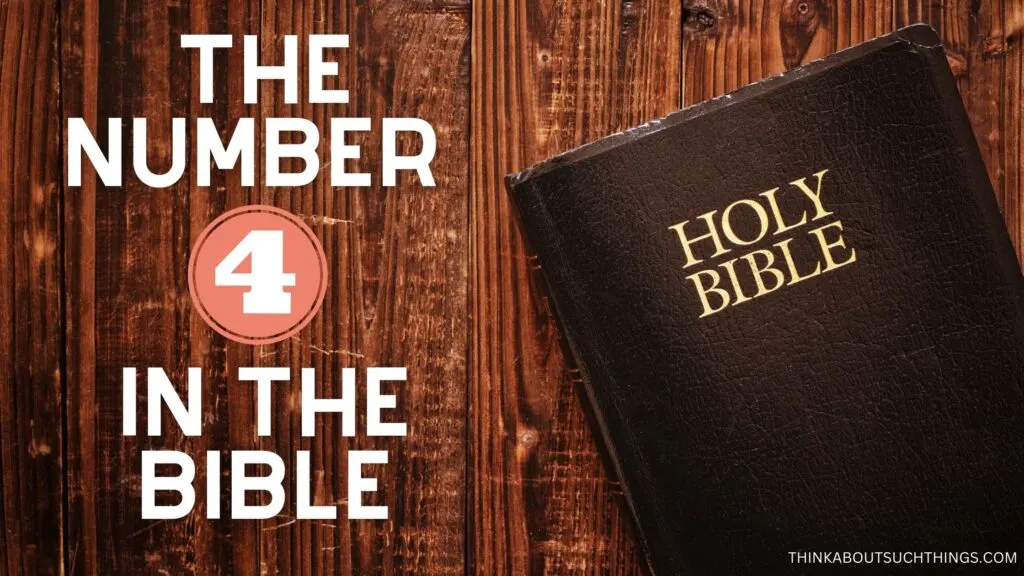
The Rivers Of Eden
In Genesis 2:10, we find the second mention of the number four: “A river flowed out of Eden to water the garden, and there it became four rivers.” The book then goes on to describe the four rivers and where they led to.
In this scripture, we can see not only one of the four elements (water) but also its close relation with the earth (creation), and it’s directly after this that God places man in the garden to work it and keep it.
The Four Corners Of The Earth
In Isaiah 11:12, we notice the following: “He will raise a signal for the nations and will assemble the banished of Israel, and gather the dispersed of Judah from the four corners of the earth.”
Today we know that the earth does not have four corners, but we also understand the value of a good metaphor. Again, we see the number four references all of creation. Wherever the Jews have dispersed, that’s where God will gather them from.
The Four Winds From Heaven
The prophet Jeremiah says in Jeremiah 49:36: “And I will bring upon Elam the four winds from the four quarters of heaven. And I will scatter them to all those winds, and there shall be no nation to which those driven out of Elam shall not come.”
This portion of scripture references four in the same way as Isaiah 11, where it refers to all the world and all of creation. God says that He will scatter the nation of Elam to the four winds, referring to every part of the earth.
The Four Judgments On Jerusalem
Ezekiel 14:21 prophecies about the judgment of God upon the people of Jerusalem to punish them for their idolatry. The judgment would come in four forms: sword, famine, wild beasts, and pestilence.
Here we can see a significant link with creation as well:
- Idolatry is the worship of creation rather than the Creator (Psalm 135:15).
- Three of the four judgments were directly related to creation: famine, wild beasts, and pestilence. Even the sword is a device created by man from metals created by God.
The Four Types Of Soil
In the parable Jesus told about the sower (Matthew 13:1-9), He mentions four types of soil:
- The path (hard, unprepared soil).
- Rocky ground with no depth.
- Thorny ground, where plants can grow but will be choked out.
- Good soil, which produces grain and a good harvest.
These represent how the gospel spreads to all people worldwide and throughout creation. Some will accept it, but others won’t.
Yet again, we can see how creation and the world tie in with the number four, but more importantly, we can see how we are to spread the seeds of the gospel within creation. And we are to do so using four witnesses – miracles, signs, wonders, and the gifts of the Holy Spirit (Hebrews 2).
It’s interesting to note how this is the first such reference since after creation and the fall that has a positive connection because we are meant to spread the gospel regardless of which of the four types of soil it will fall on. Jesus changed our perspective. Yes, the world is corrupt, and yes, creation is fallen. But we are to sow the seeds of the gospel regardless.
Various End-Times Prophecies
The number four appears in many contexts within end-time prophecies and supernatural visions. The most notable examples are:
- The four horsemen of the Apocalypse (Revelations 6).
- The four living creatures in Ezekiel’s visions (Ezekiel 1 and 10), where God shows Ezekiel the future of Israel and the eventual end of days.
These show the significance of times and seasons in creation. Everything has a season (Ecclesiastes 3), and everything’s season will eventually end.
The Four Gospels
Interestingly, God chose to reveal the truth about His Son using four accounts, each with a different perspective.
- Matthew focuses on Jesus’ Israelite heritage and the fact that He came as Israel’s Messiah, born from the line of David, fulfilling numerous prophecies.
- Mark focuses on the servanthood of Jesus and how He, as God and King, came to serve rather than to rule as an example for us.
- Luke emphasized Jesus’ perfect human nature and how He, being fully man, was perfect despite it.
- John shows Jesus as the one and only Son of God and emphasizes that Christ is God Himself, one with the Father, and there before creation.
This use of the number four seems to be in contrast with the rest. But Jesus, as Creator, is above all of creation. He laid the foundations, and “…without Him was not anything made that was made” (John 1:3).
God is a central and integral part of His creation. He was the beginning of it, and He will be there at the end. Those of us who hold fast to Christ, regardless of what fallen creation throws at us, will be there to witness His glorious victory.
The Spiritual Meaning of the Number 4
To sum up what we have learned in this study on the spiritual or Biblical meaning of the number 4.
We see a clear connection to 4 meaning things of creation or pertaining to the earth.
- Creation
- The Earth
- The Four Seasons
- The Four Directions or Winds
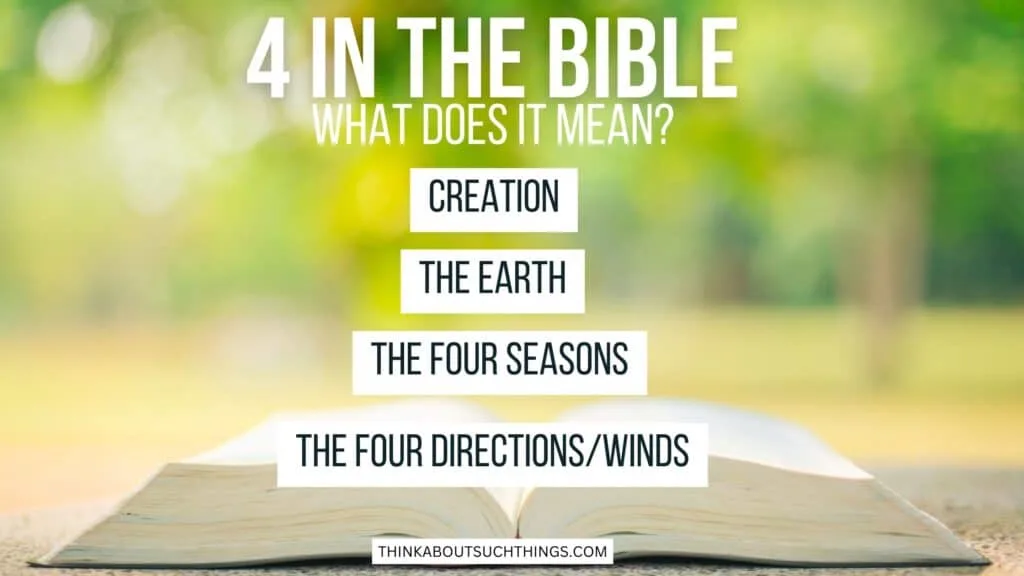
The Numbers of the Bible Series
Numbers in the Bible Series
The number four in the Bible mainly symbolizes creation, the world, and seasons. It’s not a clear-cut rule, as different contexts may lead to exciting interpretations, like how the life of Jesus is portrayed by four separate accounts. But overall, knowing what the number four usually refers to will help us to understand how God relates with His creation, its birth, and its end.

Melissa is a passionate minister, speaker and an ongoing learner of the Bible. She has been involved in church and vocational ministry for over 18 years. And is the founder of Think About Such Things. She has the heart to equip the saints by helping them get into the Word of God and fall more in love with Jesus. She also enjoys family, cooking, and reading.
She has spoken in churches in California, Oregon, Texas, and Mexico and has been featured in Guidepost Magazine and All Recipes Magazine. Read More…

